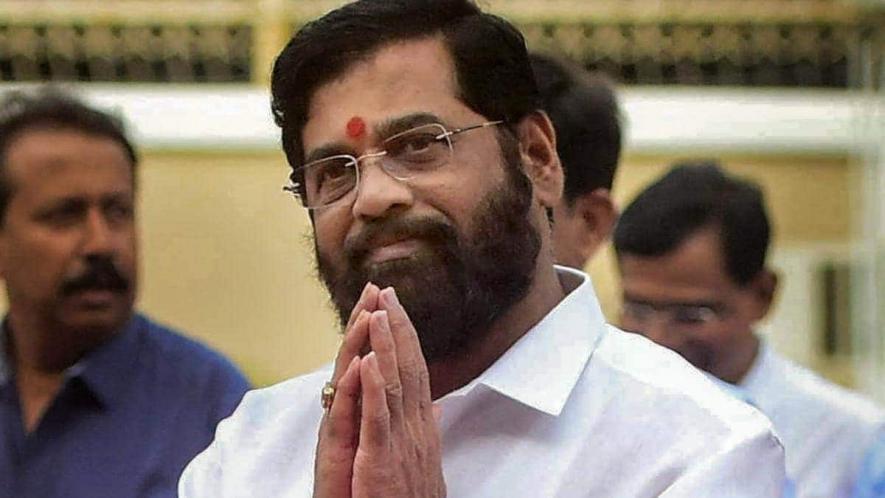The former Lok Sabha Secretary General is categorical that the 10th Schedule to the Constitution does not recognise any plea other than merger with another party as a ground for exempting a breakaway group from disqualification.
——–
Despite assuming the office of the Chief Minister of Maharashtra, Eknath Shinde, the leader of the rebel faction of Shiv Sena, may not be free from the rigours of the Tenth Schedule to the Constitution, dealing with disqualification on the ground of defection.
In an interview to The Leaflet, the former Lok Sabha Secretary General, and well-known columnist, P.D.T. Achary explained that the ground of being the original Shiv Sena is not available to Shinde and his followers, in order to evade disqualification under the Tenth Schedule. Such a plea can be decided by somebody else, not by the rebels, he emphasised.
Also read: Legislative Coups And The Tenth Schedule
The real Shiv Sena
Even the new Speaker of the assembly to be elected cannot decide which faction is the real Shiv Sena, Achary pointed out.
It is because the Speaker decides petitions under the Tenth Schedule only on the grounds as to which party set up the rebels as candidates. “That is the only basis on which the Speaker can decide”, he averred.
If the evidence suggests that it is the Udhav Thackeray faction which set up the candidates in the last election, and which gave them tickets to contest the elections, the Speaker has to take that into account, to decide which the breakaway faction is.
Therefore, if the evidence suggests that it is the Udhav Thackeray faction which set up the candidates in the last election, and which gave them tickets to contest the elections, the Speaker has to take that into account, to decide which is the breakaway faction. The names of the party office-bearers, chosen soon after the last assembly election are with the Speaker, if he is in doubt as to which faction is the real Shiv Sena, Achary suggested.
Taking a dig at the rebel faction’s claim, Achary said: “Shinde cannot say that he is the real Shiv Sena, so he should not be disqualified. If this is allowed as a plea, then any rebel leader can well say that he has married only one wife, so he should be exempted from disqualification. The 10th Schedule does not recognise any plea other than merger with another party. The two-third members (of the Shiv Sena Legislature Party) have to merge with another party in any case. That is the only valid plea a defector can raise”.
Also read: Anti-Defection Law has Failed and Should be Scrapped
Floor test
Asked whether the Supreme Court was correct in refusing a stay on the Governor’s direction for a floor test, which forced the former chief minister, Uddhav Thackeray to resign, Achary said that when a government has lost its majority in the assembly, it can no longer aid and advise the Governor.
Therefore, he said, such a government can’t remain in office, and the sooner it goes out, the better. Therefore, he suggested that the Supreme Court’s refusal to stay the floor test, directed by the Governor, has its merits.
No-confidence motion against the Speaker
But Achary is of the view that the Supreme Court was wrong in interdicting the Deputy Speaker of the assembly from deciding the disqualification petitions pending before him, as the precedents are clearly in his favour. According to him, the Deputy Speaker had correctly refused to admit the no-confidence motion against him, pending verification.
Achary also did not agree with the contention that the Tenth Schedule and the requirement of floor test for a government, whose majority is in doubt, operate in different fields.
Achary also suggested that the Deputy Speaker would have been well within the law to ignore such a motion, if it did not comply with the rules. The rules, he said, require that a motion should contain specific charges, related to his functioning in the House.
‘Different fields’ theory
Achary also did not agree with the contention that the Tenth Schedule and the requirement of floor test for a government, whose majority is in doubt, operate in different fields, as argued by the Shinde faction before the Supreme Court on Wednesday.
Achary explained: “These two are separate, but at the same time, they are inter-related; if the rebels are disqualified before the voting on the confidence motion is taken up, naturally they will not vote. To that extent, the opposition’s majority will be reduced. So, naturally, that will have its impact on the outcome of the confidence motion. But the Deputy Speaker has to disqualify them based on facts and evidence.”

























